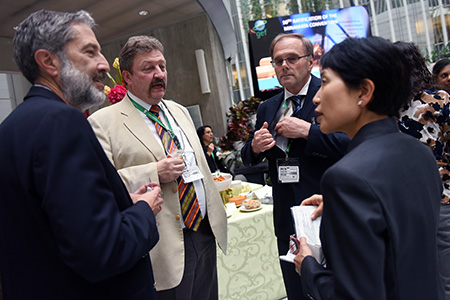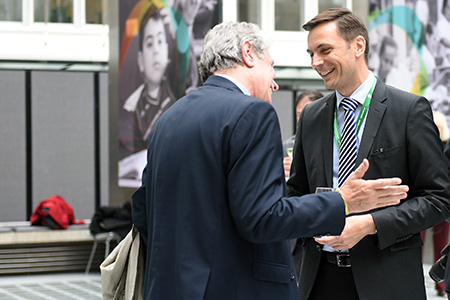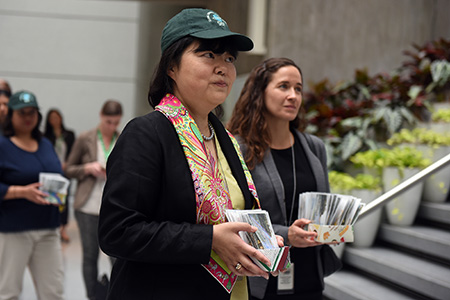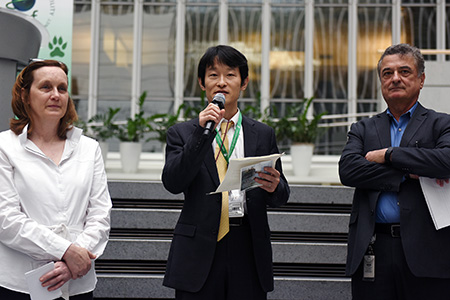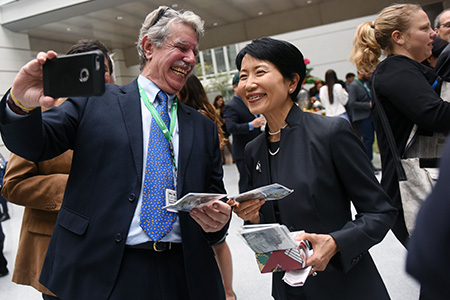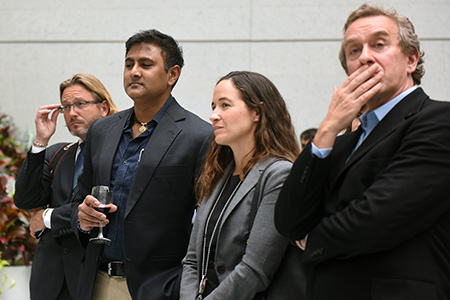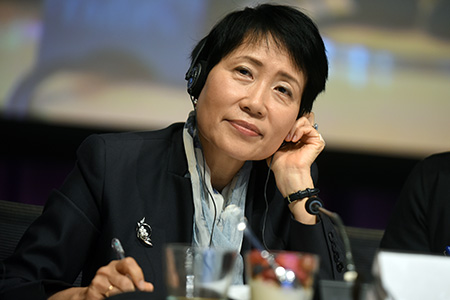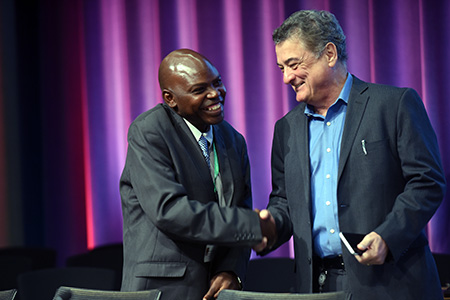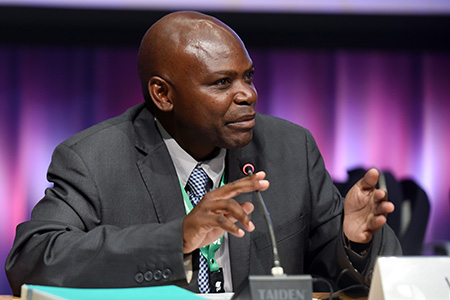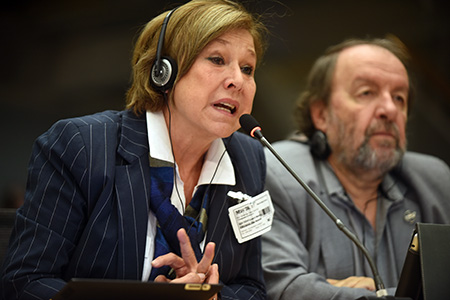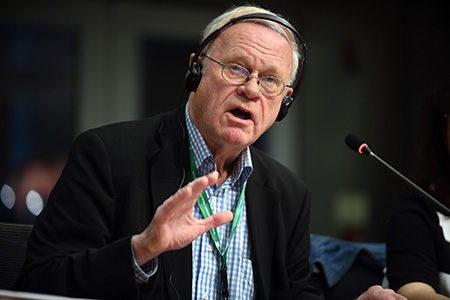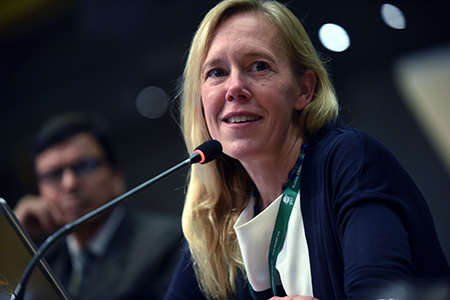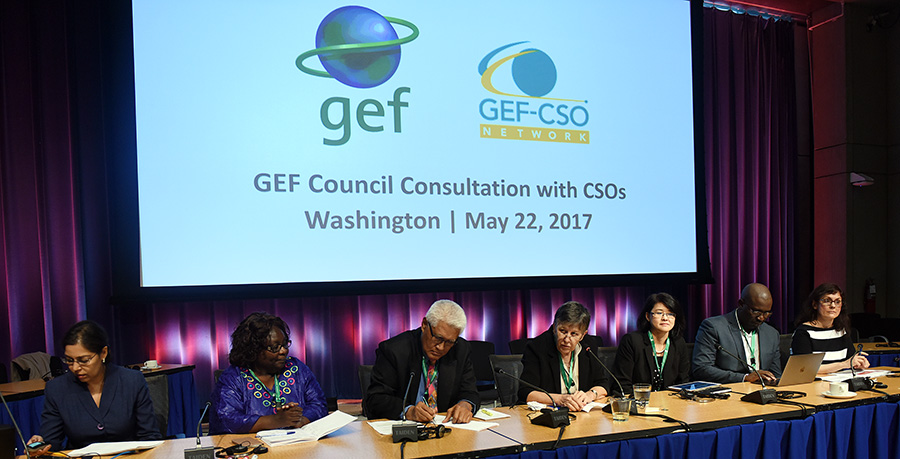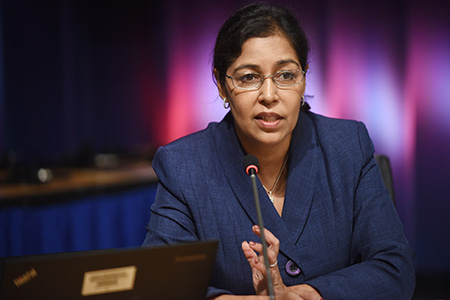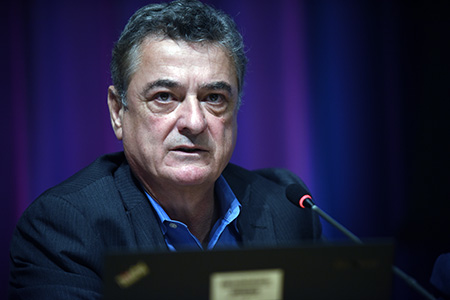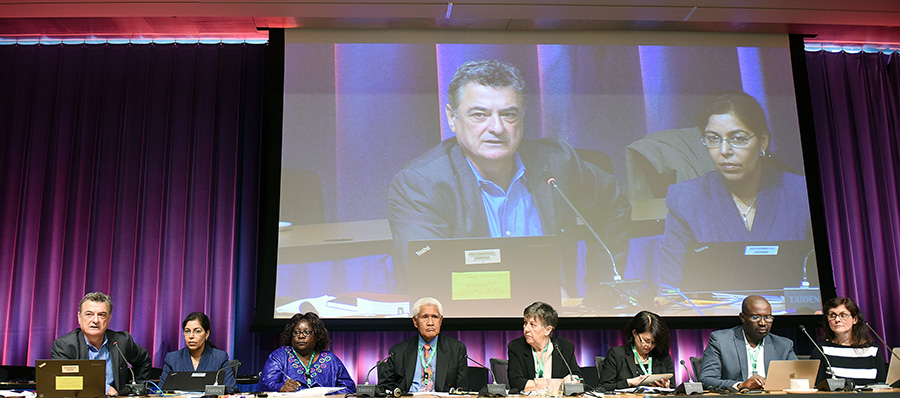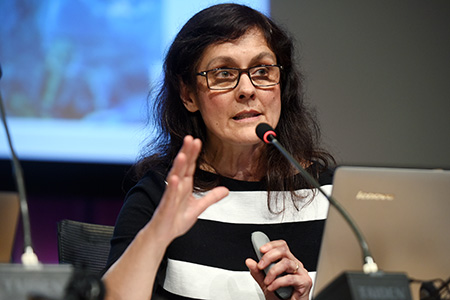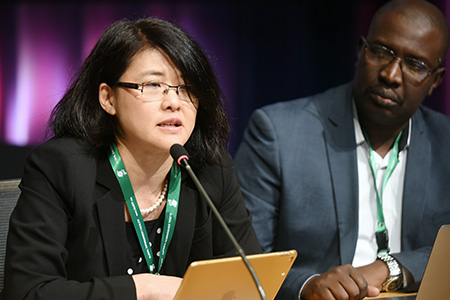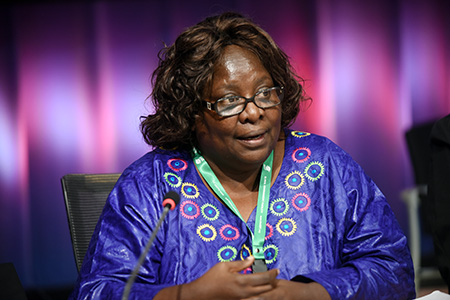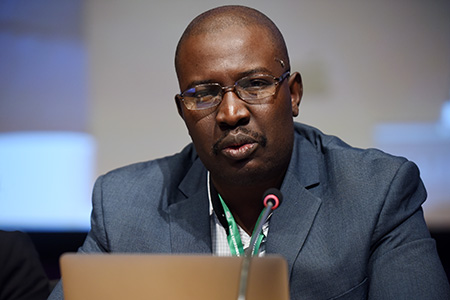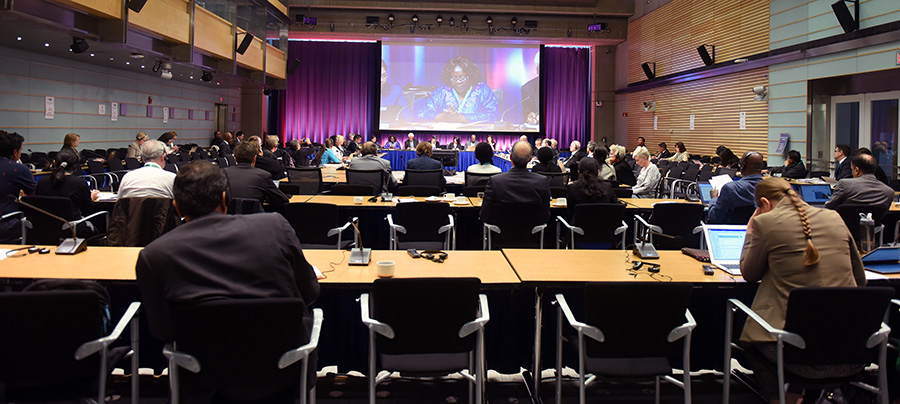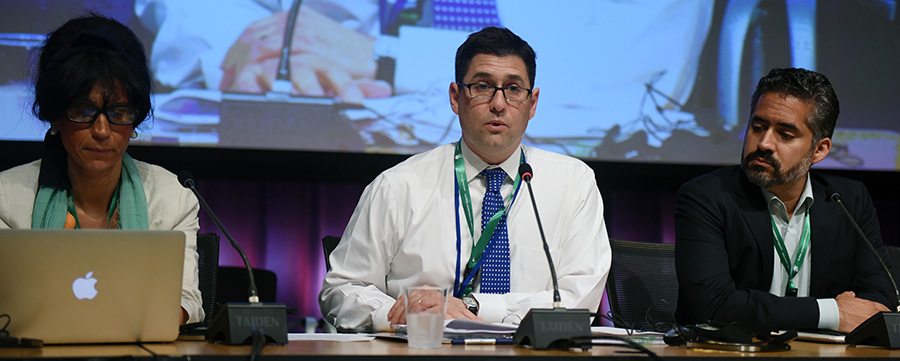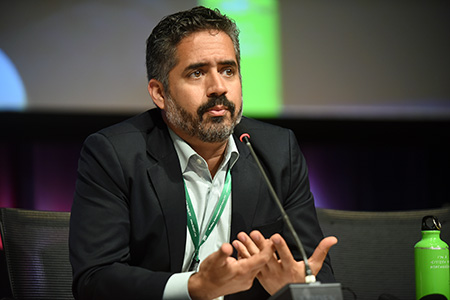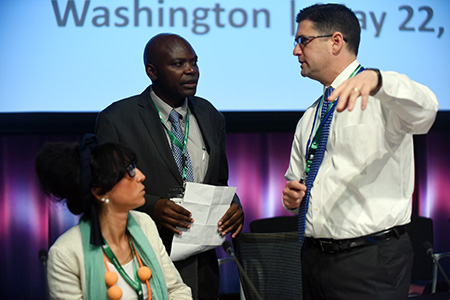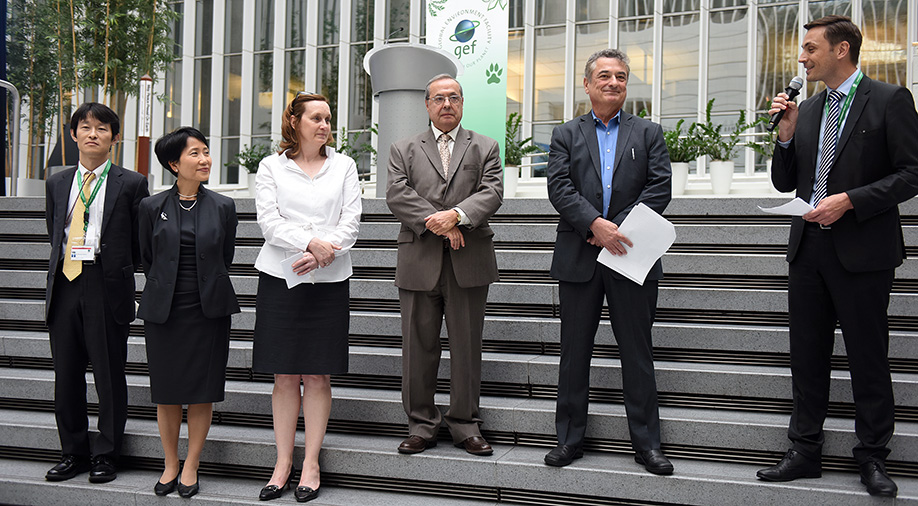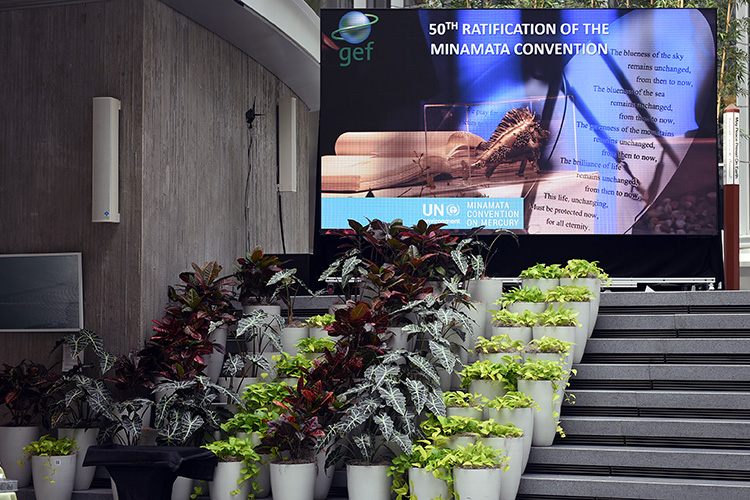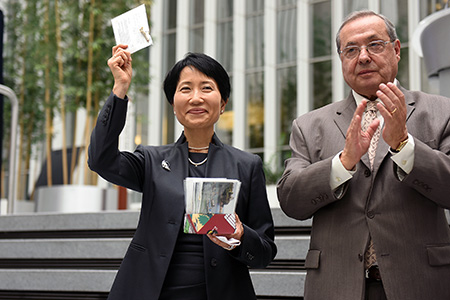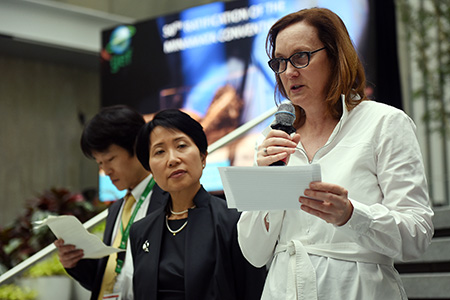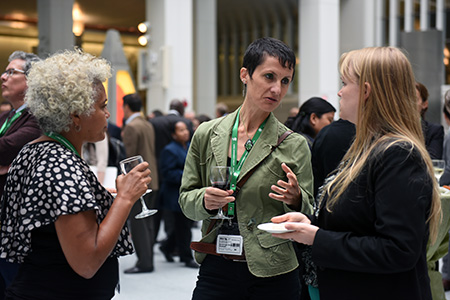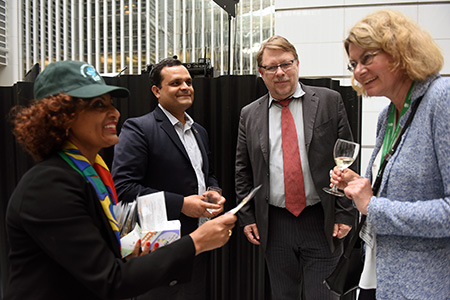Summary
The GEF Council Consultation meeting with CSOs took place on 22 May 2017, the day before the opening of the 52nd meeting of the GEF Council. The CSO consultation included a dialogue with the GEF CEO and Chairperson Naoko Ishii, and discussions on: the road towards the seventh replenishment of the GEF Trust Fund (GEF-7); and enhancing the relationship between the GEF and civil society.
A dialogue with Secretariats of Multilateral Environmental Agreements (MEAs) and the fourth meeting of the Working Group on Implementation of the GEF Public Involvement Policy convened throughout the day.
IISD Reporting Services, through its ENB+ Meeting Coverage, has provided daily web coverage from the GEF Council Consultation Meeting with CSOs. In addition, IISD Reporting Services, has produced a summary report from the 52nd GEF Council Meeting and 22nd Meeting of the LDCF/SCCF Council, which is abailable in HTML and PDF.
Photos by IISD/ENB | Leila Mead
For photo reprint permissions, please follow instructions at our Attribution Regulations for Meeting Photo Usage Page
Session 1: CSO Dialogue with the GEF CEO and Chairperson
Victor Kawanga, Vice Chair, GEF-CSO Network, opened the session, noting the ongoing process to select a host for the Network secretariat. Naoko Ishii, GEF CEO and Chairperson, highlighted increased awareness of rapid environmental degradation, noting that environmental risk currently dominates the risk landscape for business. Underscoring the evolving role of non-state actors, Ishii stressed the need to modernize civil society engagement, including through thematic organic multistakeholder platforms for food and agriculture. In the ensuing discussion, participants addressed, inter alia: resources for CSO participation; the role of the GEF Small Grants Programme (SGP) as a seed fund; direct financing of CSO projects by the GEF; and the need for mechanisms at the national level to facilitate transfer of resources from the private sector to CSOs.
GEF CEO and Chairperson Naoko Ishii
Victor Kawanga, Vice-Chair of the GEF-CSO Network, and Gustavo Fonseca, GEF Secretariat
Victor Kawanga, Vice-Chair of the GEF-CSO Network
Elsa Escobar, Fundación Natura Colombia,
intervenes during the dialogue.
Wouter Veening, Institute for Environmental Security, intervenes during the dialogue.
Lisa Elges, Transparency International EU, during the dialogue
Session 2: The Road towards GEF-7
Patricia Turpin, Regional Focal Point (RFP) Caribbean, GEF-CSO Network, and Fiu Mataese Elisara, RFP Pacific, GEF-CSO Network, co-moderated this session, which included a panel discussion on the status and progress of work under GEF-6. Gustavo Fonseca, GEF Secretariat, provided an update on the proposed programming directions for GEF-7, emphasizing ongoing consultations with donors, agencies, MEA Secretariats, CSOs and other stakeholders. He stressed the need to focus on key economic systems impacting the global environment, noting that such focus should reflect the priorities expressed by countries, including through their nationally determined contributions (NDCs).
Baljit Wadhwa, GEF Independent Evaluation Office (IEO), presented an update on the ongoing Sixth Overall Performance Study of the GEF (OPS6) in the areas of performance and impact, policies, financing, governance and partnerships. She also noted the final evaluation report to be released in September 2017.
Yoko Watanabe, Global Manager, SGP, outlined the SGP’s achievements, future vision and strategy, project examples and key directions on upscaling the Programme, including through: ensuring that local communities are at the forefront of protecting the global commons; building, replicating and scaling up strategic partnerships; and promoting social inclusion. Tanyaradzwa Mundoga, Council Member, provided an update on the ongoing GEF-7 replenishment negotiations. He urged GEF Council Members to bridge the gaps between the GEF’s current actions and “what is really needed to achieve the Sustainable Development Goals (SDGs).”
Olga Speranskaya, Co-Chair, International Persistent Organic Pollutants Elimination Network (IPEN), emphasized the linkages among chemicals and the 17 SDGs. She said GEF-6 funds available for chemicals are US$554 million, while US$1.9 billion is needed. She noted that annual chemicals-related health costs are only a small fraction of the chemical industry’s revenue each year. Speranskaya stressed that SGP funding for chemicals should be proportional to GEF funding for chemicals. Lisa Elges, Transparency International EU, underscored the need for better transparency and accountability. She noted demand for more fair and direct access to GEF resources by CSOs in developing countries.
Lucy Mulenkei, Chair, Indigenous Peoples Advisory Group (IPAG), underscored the importance of the SGP for indigenous peoples organizations. She highlighted indigenous peoples’ challenges related to participating and achieving visibility in international conventions.
In the ensuing discussion, participants addressed, inter alia: raising local awareness of chemicals- and gender-related issues; developing a capacity-building scheme under the SGP; the need for knowledge sharing in, and scaling up of, SGP projects; the role of the GEF Partnership in co-financing SGP projects; GEF-7 policy proposal on CSO engagement; and the future direction of the GEF-CSO Network under GEF-7.
A view of the dais during the session (L-R): Baljit Wadhwa, GEF IEO; Lucy Mulenkei, Chair, IPAG; Session Co-Moderators Fiu Mataese Elisara, RFP Pacific, GEF CSO Network, and Patricia Turpin, RFP Caribbean, GEF CSO Network; Yoko Watanabe, SGP Global Manager; Tanyaradzwa Mundoga, GEF Council Member, Zimbabwe; and Olga Speranskaya, IPEN
Baljit Wadhwa, GEF IEO
Gustavo Fonseca, GEF Secretariat
A view of the dais during the intervention of Gustavo Fonseca, GEF Secretariat
Olga Speranskaya, IPEN
Yoko Watanabe, SGP Global Manager
Lucy Mulenkei, Chair, IPAG
Tanyaradzwa Mundoga, GEF Council Member, Zimbabwe
A view of the room during the session
Session 3: Enhancing the Relationship between the GEF and Civil Society
Peter Wisner, Council Member, US, presented the draft progress report of the Ad-Hoc Council Working Group on GEF and Civil Society. He outlined a vision of the relationship between GEF and CSOs, highlighting the overarching objective of achieving greater results and CSOs’ advisory role to the GEF Council. Wisner invited specific suggestions on enhancing the relationship between CSOs and recipient governments.
During the discussion, CSO members highlighted issues including: strengthening CSOs’ engagement at the local, regional and international levels; the need for more discussion of the report; securing financial support for the GEF-CSO Network activities; and formalizing the role of CSOs in reporting country non-compliance.
L-R: Nana Janashia, Caucasus Environmental NGO Network; Peter Wisner, GEF Council Member, US; and Ramon Cruz, Institute for Transportation and Development Policy
Ramon Cruz, Institute for Transportation and Development Policy
L-R: Nana Janashia, Caucasus Environmental NGO Network; Victor Kawanga, Vice-Chair of the GEF-CSO Network; and Peter Wisner, GEF Council Member, US
Reception to Celebrate the 50th Ratification of the Minamata Convention on Mercury
GEF Council member Mitsutoshi Kajikawa, Japan, Naoko Ishii, GEF CEO and Chairperson, Caryn McClelland, Acting Principal Deputy Assistant Secretary, US Department of State, Carlos Gianelli Derois, Uruguayan Ambassador to the US, Gustavo Fonseca, GEF Secretariat, and Jacob Duer, Principal Coordinator, Interim Secretariat of the Minamata Convention
